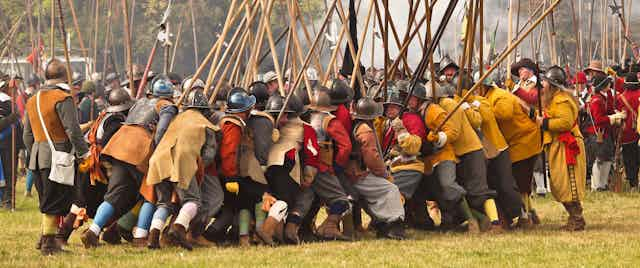Last September, I wrote apropos of Jeremy Corbyn’s election as Labour Party leader: “The drum beat towards civil war within Labour gets louder”. And so it has proved. For a party that once danced to the tune of Things Can Only Get Better, it is difficult to see how they can get any worse. And yet they can. Will Labour now split?
The National Executive Committee’s decision to allow Corbyn to be automatically included on the ballot for the leadership may have given the party a breather. Had the decision gone the other way, Corbyn’s support group Momentum would have refused to acknowledge whoever replaced him as Leader. A civil war would have ensued with Corbyn and his followers as Roundheads and the majority of the Parliamentary Labour Party as unlikely Cavaliers – though their tragedy is that they lack the dash and sparkle of Prince Rupert of the Rhine.
Corbyn’s Cromwellian leadership embodies the puritan determination to seek out evil. His virtue-signalling aim is a bonfire of modern vanities. Trident and hedge fund managers will be shown the door.
Labour’s Cavaliers agree with some of this but cheerfulness keeps breaking through. This sunnier outlook has been their creed ever since the 1950s, when party member Tony Crosland wrote in criticism of Labour puritans:
Total abstinence and a good filing-system are not now the right sign-posts to the socialist Utopia; or at least if they are, some of us will fall by the wayside.
Despite opposition from the parliamentary party, the likelihood is that Corbyn will win another resounding victory in this leadership election (which is why he emerged from the NEC meeting looking so chipper). The grassroots have made it clear that Corbyn needs more time to do the job. The best the Parliamentary Labour Party can hope for is that the Roundhead majority in the membership gets a bit reduced.
After the vote
So what happens if Corbyn wins? Possibly nothing. Labour’s Roundheads and Cavaliers may just co-exist in an uncomfortable truce.
Alternatively, Momentum may decide to press ahead with a programme of deselection. It has been threatening for some time to pressure local Labour parties to withdraw their support for certain candidates ahead of the next election. It will now no doubt cite the alleged treachery of the recent coup attempt as a reason to take out MPs who do not represent its views.
If that starts to happen – and if high profile figures such as Hilary Benn and Angela Eagle get turfed out – it is difficult to see how there will not be a split followed by an unedifying and pointless battle over who owns the “Labour Party” name.

Where history makes a difference is that most protagonists look back to the experience of Labour in the 1980s. Labour split and a new centrist party, the Social Democratic Party, came into being. But the SDP did not turn out too well. Its main achievement was to split the opposition vote and maintain the Conservatives in power for a generation.
What defeated the SDP was not so much Thatcherism as the first-past-the-post electoral system. As it currently stands, the electoral system really only has room for two parties – as the Lib Dems, Greens and UKIP know to their cost. Corbynistas should look on the experience of the SDP and recall that the right wing of the Labour Party (and its supporters) does have somewhere else to go. History suggests both sides need to dial it back.
Labour can only be run effectively if it is a genuine coalition of the left and the centre or if the Roundheads find a way of working with Cavaliers.
Labour has always been prone to factionalism because politics on the left always has to mean something. People are judged by what they represent. But while the party has had bad moments, this is truly its darkest hour.
The truth is that only two things can defeat Corbyn. The first is the power of alternative ideas. The Cavaliers have not been exactly overflowing with these (though the Roundheads aren’t doing too well either). The second is Corbyn’s real nemesis: the British electorate. Nine months in and he has not come up with a single reason to make a Tory vote Labour. Has anyone even mentioned the words “Middle England” to him?
The current coup seems to have been sparked by the belief, following the referendum, that a general election was on the cards and Corbyn needed to be ditched. The truth is that a quick election is the Cavaliers’s best hope. Defeat might prompt Corbyn’s departure.
What to do? Labour bickers while food banks proliferate (there are 200 families using food banks in Theresa May’s Maidenhead constituency, according to The Economist). The two sides might be advised to turn to one of the most insightful guides to British politics, 1066 and All That. There, they will discover that the Cavaliers were “wrong but wromantic” and the Roundheads were “right but repulsive”.

